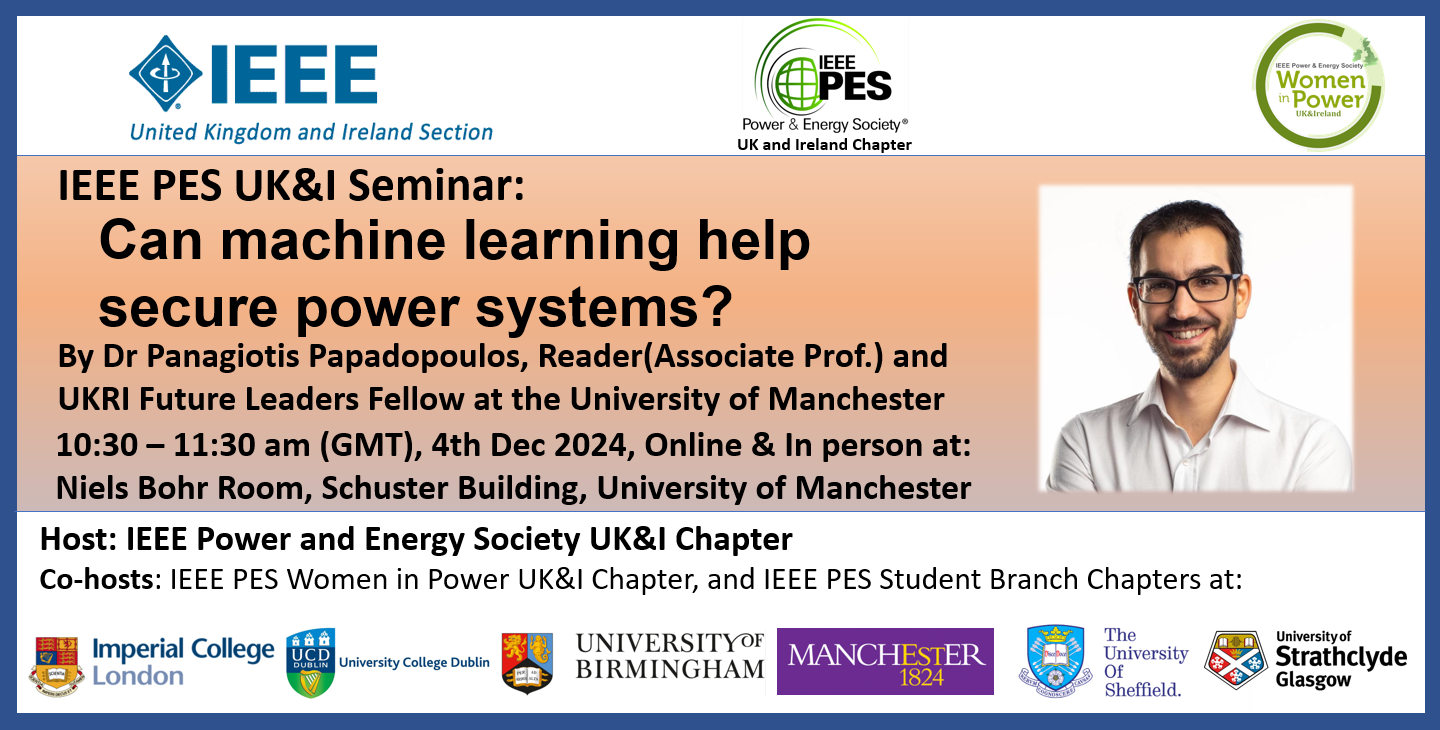IEEE PES UK&I Seminar on 4th Dec 2024: Can machine learning help secure power systems?
Dear All PES members,
This year, the IEEE PES UK&I Chapter will host a technical talk "Can machine learning help secure power systems?" given by Dr Panagiotis Papadopoulos from 10:30 am -11:30 am (GMT) on 4th Dec 2024 at the University of Manchester & Online.
This event is co-hosted by the PES Student Branch Chapter at The University of Manchester and all other PES Student Branch Chapters in UK and Ireland, and is sponsored by The University of Manchester. All PES members based in UK and Ireland are welcome to attend!
Time & Date: 10:30 am - 11:30 am, Wednesday, 4th of December 2024
Venue: Niels Bohr Room, Schuster Building, University of Manchester, Manchester, UK, M13 9PL & Online
(Online link will be sent to registrants before event)
Summary: Electrical power systems are undergoing unprecedented changes mainly driven by decarbonisation targets and climate change as well as other technical, economic and social reasons. This leads to the integration of new technologies such as renewable generation, electric vehicles, HVDC links, etc. These devices are mostly connected via power electronics with very different dynamic behaviour, leading to increasing complexity of power system dynamics. In addition, uncertainty is also increasing due to intermittent nature of renewable generation but also because of how society will use energy on the way to decarbonization (e.g. electrification of transport or possibly heating). At the same time, advanced measurement and communication infrastructure is being integrated in modern power systems. Such technologies, especially couple with machine learning, offer opportunities for advanced situational awareness, decision support tools and automated control methods.
This presentation will highlight the challenges faced in future power systems with high penetration of converter connected units, in terms of their dynamic behaviour, and discuss methods and tools to tackle them, inspired to a large extent by machine learning. Such methods can enable system operators to consider detailed dynamics in cases where the computational effort needed is otherwise prohibitive. Two main aspects will be discussed related to: i) how do we model and characterize the complex and uncertain dynamic behaviour in power systems with high converter penetration and ii) how machine learning can enable fast and informative dynamic security assessment with focus on how to build trust in such methods going beyond the notion that machine learning is simply a powerful black-box predictor.
Probabilistic stability assessment methods to quantify the impact and characterize new types of interactions of power systems with converter connected units at both transmission and distribution level will be discussed. Machine learning based methods to enable fast stability assessment in operational and planning timescales will be presented with focus on explainability for improved decision support, graph-based methods that take into consideration dynamics, and physics informed reinforcement learning. Methods enabling the ability to account for detailed dynamics in optimisation will also be presented.
This event is embedded in our AGM. If you would like to explore more about our achievements and visions of the IEEE PES UK&I Chapter, you are welcome to registrer with this link https://events.vtools.ieee.org/m/447455 to attend our AGM on the same day!
Looking forward to meeting you there!
Regards,
PES Chapter Committee Team
Email Website LinkedIn Twitter YouTube
Date and Time
Location
Hosts
Registration
-
 Add Event to Calendar
Add Event to Calendar
Loading virtual attendance info...
- Niels Bohr Room
- University of Manchester, England
- United Kingdom M13 9PL
- Building: Schuster Building
- Click here for Map
- Contact Event Hosts
-
Elizabeth Michalenko elizabeth.michalenko@manchester.ac.uk
- Co-sponsored by The University of Manchester
Speakers
Panagiotis Papadopoulos of University of Manchester
How Can Machine Learning Help Keep Power Systems Secure?
Biography:
Panagiotis Papadopoulos is a Reader (Associate Prof.) in the Department of Electrical and Electronic Engineering at the University of Manchester and a UK Research and Innovation Future Leaders Fellow working on “Addressing the complexity of future power system dynamic behaviour”. He received the Dipl. Eng. and Ph.D. degrees from the Department of Electrical and Computer Engineering at Aristotle University of Thessaloniki, in 2007 and 2014, respectively. From 2014-2017, he was a post-doctoral Research Associate at the University of Manchester and in 2017, he joined the University of Strathclyde as a Lecturer.
His research interests are in the area of power system stability and dynamics under increased uncertainty, introduced due to the integration of new technologies. He is also interested in power system applications of machine learning to tackle complex problems related to power system stability.
He has authored more than 70 papers in international journals and conferences. He is the Technical Committee Program Chair of the Power System Dynamic Performance Committee of IEEE Power and Energy Society and has also been a member of the IEEE PES Long Range Planning Committee, the chair of the IEEE UK and Ireland, PES chapter and a member of the IET Engineering Policy Group Scotland. He also received the Outstanding Engineer Award in 2021 from IEEE Power and Energy Society, UK and Ireland Chapter. He is currently a member of the IEEE Big Data Analytics Working Group and the CIGRE C2.42 Working Group related to applications of machine learning in power systems.
He has also worked in collaboration with industrial partners, including National Grid Electricity System Operator UK, SP Energy Networks, SSE, Scottish Power Renewables, Hitachi Energy, EPRI USA, IBM, GE Grid Solutions and the Alan Turing Institute in the UK.



